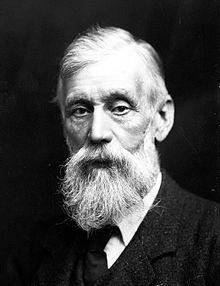Michael Foster (Michael Foster)

Michael Foster was born in Huntingdon, Huntingdonshire, in March 1836, the son of Michael Foster, FRCS. He was educated at Huntingdon Grammar school and University College School, London. After graduating in medicine in 1859, he began to practise in his native town, but in 1867 he returned to London as teacher of practical physiology at University College London, where two years afterwards he became professor. In 1870 he was appointed by Trinity College, Cambridge, to its praelectorship in physiology, and thirteen years later he became the first occupant of the newly created chair of physiology in the university, holding it till 1903. One of his most famous students at Cambridge was Charles Scott Sherrington who went on to win the Nobel Prize in 1932. He married first, in 1864, Georgina Edmonds, daughter of Cyrus Read Edmonds. Following her death in 1869, he married secondly, in 1872, Margaret Rust, daughter of George Rust, JP, of Huntingdon. He excelled as a teacher and administrator, and had a very large share in the organization and development of the Cambridge biological school. From 1881 to 1903 he was one of the secretaries of the Royal Society, and in that capacity exercised a wide influence on the study of biology in Britain. In the 1899 Birthday Honours, he was created a Knight Commander of the Order of the Bath (KCB), and served as president of the British Association at its meeting at Dover in September 1899.
Michael Foster was elected to represent the University of London in parliament in a by-election in February 1900, and returned unopposed in the 1900 general election held later the same year. He stood for the Liberal Unionist Party, and though returned as a Unionist, his political action was not to be dictated by party considerations, and he gravitated towards Liberalism. He played no prominent part in parliament and at the election of 1906 was defeated. He was joint editor with E. Ray Lankester of The Scientific Memoirs of Thomas Henry Huxley. His chief writings were a Textbook of Physiology (1876), which became a standard work, and Lectures on the History of Physiology during the 16th, 17th and 18th Centuries (1901), which consisted of lectures delivered at the Cooper Medical College, San Francisco, in 1900. He died suddenly in London. Foster was also the binomial author of many iris species. One of many irises he introduced includes Iris lineata Foster ex Regel (or A.Regel), which was originally described and published in Gartenflora (1887), and later cited in Curtis’s Botanical Magazine (1888). The standard author abbreviation Foster is used to indicate this individual as the author when citing a botanical name. Iris fosteriana was named in 1881, after Sir Michael Foster by Dr Aitchison, and found in Pendjeh, Turkmenistan.
Born
- March, 08, 1836
- United Kingdom
- Huntingdon, England
Died
- January, 29, 1907
- United Kingdom
- London, England
Cemetery
- Huntingdon, Priory Road Cemetery
- Huntington, Cambridgeshire, England
- United Kingdom



